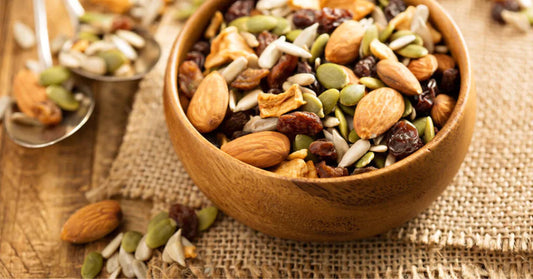How do walnut kernels help lower cholesterol levels?
Summary: Walnut kernels help lower cholesterol levels due to their high content of omega-3 fatty acids, antioxidants, and fibre. They reduce LDL (bad) cholesterol and increase HDL (good) cholesterol.
Detailed Answer:
- Omega-3 Fatty Acids: Walnuts are rich in alpha-linolenic acid (ALA), a type of omega-3 fatty acid that helps reduce LDL cholesterol levels and improve heart health.
- Antioxidants: Walnuts contain antioxidants like polyphenols that prevent oxidation of LDL cholesterol, reducing the risk of plaque formation in arteries.
- Fibre: The fibre content in walnuts helps in binding cholesterol in the digestive system, preventing its absorption into the bloodstream.
- Phytosterols: Walnuts contain phytosterols, plant compounds that interfere with cholesterol absorption, leading to lower LDL cholesterol levels.
-
Healthy Fats: The monounsaturated and polyunsaturated fats in walnuts contribute to overall cholesterol balance by increasing HDL (good) cholesterol.

What is the recommended daily intake of walnut kernels for heart health?
Summary: The recommended daily intake of walnut kernels for heart health is about 1 to 1.5 ounces (28-42 grams) or approximately 7-10 whole walnuts. This quantity provides essential nutrients without excessive calorie intake.
Detailed Answer:
- Portion Size: Consuming 1 to 1.5 ounces (28-42 grams) of walnuts daily is ideal for obtaining their heart health benefits without excessive calorie consumption.
- Whole Walnuts: This portion size equates to approximately 7-10 whole walnuts or a small handful.
- Nutrient Intake: This recommended intake provides a good balance of omega-3 fatty acids, antioxidants, fibre, and healthy fats, all of which contribute to heart health.
- Regular Consumption: Including walnuts in your daily diet can help maintain consistent levels of heart-healthy nutrients and contribute to long-term cardiovascular health.
-
Balanced Diet: Ensure that your overall diet remains balanced, with a variety of foods contributing to your heart health alongside walnuts.
Are there any side effects of consuming walnut kernels regularly?
Summary: While walnut kernels are generally safe and healthy, overconsumption may lead to weight gain, digestive issues, and allergic reactions in some individuals. Moderation is key to reaping their benefits without adverse effects.
Detailed Answer:
- Weight Gain: Walnuts are calorie-dense, and consuming them in large quantities can lead to weight gain. Stick to the recommended portion size to avoid excess calorie intake.
- Digestive Issues: Some individuals may experience digestive issues like bloating or gas due to the fibre content in walnuts. Introduce them gradually into your diet to allow your digestive system to adjust.
- Allergic Reactions: Walnuts are a common allergen. Individuals with nut allergies should avoid walnuts to prevent allergic reactions, which can range from mild to severe.
- Medication Interactions: Walnuts contain compounds that may interact with certain medications, such as blood thinners. Consult with a healthcare provider if you are on medication.
-
Oxalate Content: Walnuts contain oxalates, which can contribute to kidney stone formation in susceptible individuals. Moderation is crucial if you have a history of kidney stones.

Can walnut kernels be included in a heart-healthy diet plan?
Summary: Yes, walnut kernels can be included in a heart-healthy diet plan. They can be added to salads, yoghurt, oatmeal, or eaten as a snack to provide essential nutrients that support heart health.
Detailed Answer:
- Salads: Add chopped walnuts to salads for a crunchy texture and a boost of heart-healthy nutrients.
- Yoghurt and Oatmeal: Sprinkle walnuts on yoghurt or oatmeal to enhance their nutritional value and provide healthy fats, fibre, and antioxidants.
- Snacks: Enjoy a handful of walnuts as a convenient and nutritious snack that supports heart health.
- Cooking and Baking: Incorporate walnuts into various recipes, including baked goods, smoothies, and stir-fries, to add flavour and nutrition.
-
Variety: Including a variety of heart-healthy foods in your diet, along with walnuts, ensures a balanced intake of nutrients essential for cardiovascular health.

How do walnut kernels compare to other nuts in terms of heart health benefits?
Summary: Walnut kernels are particularly beneficial for heart health due to their high content of omega-3 fatty acids, antioxidants, and fibre. While other nuts also offer heart health benefits, walnuts are uniquely rich in certain nutrients that support cardiovascular health.
Detailed Answer:
| Nut | Omega-3 Content | Antioxidants | Fiber | Unique Benefits |
|---|---|---|---|---|
| Walnuts | High | High | High | Rich in ALA, prevents LDL oxidation |
| Almonds | Low | Moderate | High | High in vitamin E, good for skin health |
| Pistachios | Low | Moderate | Moderate | Contains lutein, supports eye health |
| Cashews | Low | Moderate | Moderate | Rich in copper, supports bone health |
| Pecans | Low | High | Moderate | Rich in monounsaturated fats, supports heart health |
Conclusion
Walnut kernels are a powerful ally for heart health, thanks to their high content of omega-3 fatty acids, antioxidants, and fibre. Regular consumption of walnuts can help lower LDL cholesterol levels and increase HDL cholesterol levels, promoting cardiovascular health. It's recommended to consume 1 to 1.5 ounces of walnuts daily as part of a balanced diet. While walnuts are generally safe, moderation is key to avoid potential side effects like weight gain, digestive issues, and allergic reactions. Including walnuts in a heart-healthy diet plan is easy, as they can be added to salads, yoghurt, oatmeal, and more. Compared to other nuts, walnuts stand out for their unique benefits, particularly their omega-3 content. Embrace the heart health benefits of walnut kernels and make them a regular part of your diet for better cardiovascular health.














